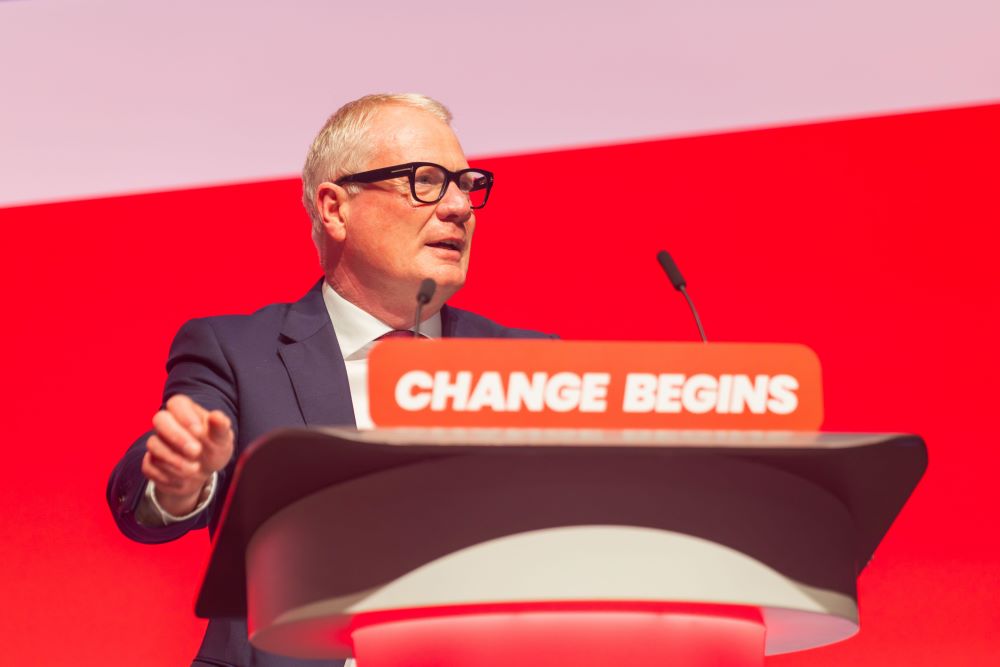West Midlands Mayor Accuses Whitehall Of Being "Resistant" To Greater Devolution
Labour leader Keir Starmer celebrated Richard Parker's election as Mayor of the West Midlands in May (Alamy)
5 min read
West Midlands Mayor Richard Parker believes civil servants in Whitehall are “resistant” to supporting government plans for more regional devolution, and hopes the Budget will allow mayors greater flexibility over their own finances and projects.
Parker was elected in May as the first Labour Mayor of the West Midlands Combined Authority, defeating incumbent Conservative mayor Andy Street. He campaigned for a “fresh start” for the region and said his priority would be to “create new jobs and training places in every town and city across the West Midlands”.
Next Wednesday, Chancellor Rachel Reeves will deliver her first Autumn Budget and the first Labour Budget in more than 14 years, having repeatedly stressed that “difficult decisions” will need to be made to repair the “£22bn black hole” left by the previous Tory government. Reeves is therefore widely expected to announce tax rises and cuts to departmental budgets.
While Parker said he recognised the difficult inheritance for the new Labour administration and admitted he could not simply go around “asking for more funds”, he told PoliticsHome he wanted a greater “ability to deploy the resources coming into this region”.
Although he said he had heard positive noises from the Government on widening devolutionary powers, he was critical of the civil service for being “reluctant” to accept change.
“I've been having discussions with senior people in the Government over the last 12 months – there is a commitment I'm absolutely certain about from Rachel Reeves, from Angela Rayner [Deputy Prime Minister], from Liz Kendall [Work and Pensions Secretary] and Bridget Phillipson [Education Secretary], about the benefits of more devolution and more decisions made in the regions around key policy interventions,” he said.
“The reluctance I currently witness is largely from Whitehall, who are still struggling with this new philosophy.”
Mayor for Greater Manchester Andy Burnham told The Financial Times last month that the UK Treasury needs to help unlock infrastructure investment rather than “saying no to everything”.
Parker suggested he felt this comment was harsh, but did think there were issues with the culture across Whitehall, particularly in the Treasury.
“I don't believe they are saying no to everything,” he said.
“Once the Treasury has set the fiscal parameters for the country, my biggest issue is ensuring that the Whitehall departments work really creatively and with a sense of purpose with mayors to ensure that we don't just get the money to support what we're doing now, but we have the freedom to use that money more flexibly.
"That is where I see the resistance.”
He said his “biggest frustration and concern” was that civil servants needed to “adopt a new approach and demonstrate that they are committed to devolution” by giving mayors “freedoms” to decide how they spend and prioritise money on projects.
“Once we turn that corner, I will truly believe that we're on this relentless path to devolution, but we've not yet turned that corner,” he said.
 Chancellor Rachel Reeves will deliver the Labour Government's first Budget on Wednesday (Alamy)
Chancellor Rachel Reeves will deliver the Labour Government's first Budget on Wednesday (Alamy)
Reeves this week confirmed to reporters in Washington DC that she will amend the fiscal rules in the Budget to change the way the Government measures debt. This, in turn, will enable her to borrow and spend more money.
A Savanta survey for PoliticsHome suggests voters support this approach, with 38 per cent of people telling the pollster the chancellor should increase borrowing to invest in large infrastructure projects, and 22 per cent saying she should not.
Parker also supports the move, saying that in his view Reeves had been the “first chancellor to have recognised the failures of Treasury orthodoxy”.
Looking ahead to the Budget next week, Parker would like to see more clarity on what roles mayors will play going forwards in determining the shape of transport and infrastructure projects, the funding of housing provision, and post-16 skills.
In his view, greater devolution across these areas would help to “drive growth” in the region.
“I need access to more of the levers that could drive growth than I've got now,” he said.
“The devolution delivered to date has been bit of a fudge and it's been partial. There's been historically a great deal of resistance from previous governments, from both Westminster and Whitehall, about letting go.”
The West Midlands Mayor admitted he was concerned about potential departmental cuts, particularly in transport. Mayors across England have been lobbying the Government against potentially cutting hundreds of millions of pounds of local transport funding, according to The Guardian, due to fears that bus, tube and tram improvements could be at risk.
 Richard Parker worked in business before being elected as West Midlands Mayor (Alamy)
Richard Parker worked in business before being elected as West Midlands Mayor (Alamy)
"If the Government wants to grow the economy in the way I want to grow it here – and I believe it does – I'd be really clear that maintaining our bus network in the West Midlands is absolutely key to that," Parker said.
“We've got some very important transport projects here and funding we want to secure for our bus network that is holding our transport system together for the next 12 to 24 months.
“So having some certainty around those commitments is really, really important, because once that money comes in, it gives us an ability to move forward without having to revisit or re-scope what's happening.”
Last month, Parker wrote to Rayner, who is also Secretary of State for Housing, Communities and Local Government, asking for the Government to release money that was previously ring-fenced for housing developments on brownfield sites, but did not get spent. Releasing the £146m in funding that was pledged by former Tory mayor Street would help build around 2,000 social homes in the region.
“I want some more flexibility on the resources we’ve got here,” Parker said.
“I've got 20,000 families in the West Midlands in temporary accommodation and a massive shortage of affordable and social housing. I've asked Angela if I can have more flexibility, so I can use that money to target those types of tenure, working with other partners.
“That will help take families out of temporary accommodation that is very expensive, often poor quality, and often the tenancies are really insecure. It's also costing local authorities a lot of money supporting that accommodation.”
